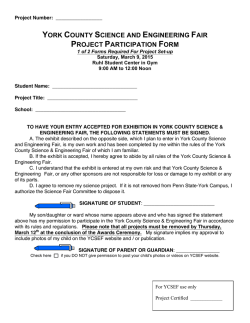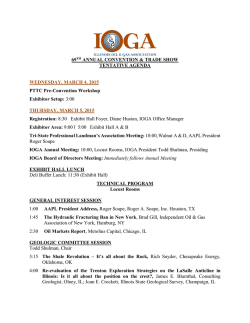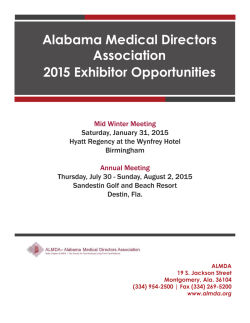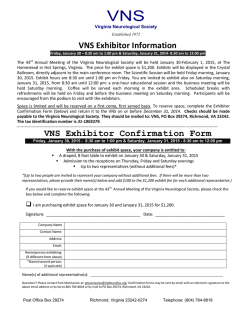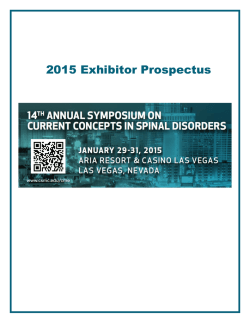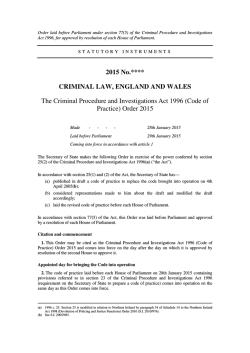
Conference Agenda - Insurance Committee For Arson Control
1/29/2015 26th Annual ICAC Fire & Arson Investigation Seminar Orlando, FL Sunday, February 22, 2015 2:00 p.m. – 6:00 p.m. ICAC Registration Desk Open Monday, February 23, 2015 8:00 a.m. – 5:00 p.m. Registration Desk & Exhibit Show Open 8:00 – 9:00 a.m. Continental Breakfast in Exhibit Show Area 9:00 – 9:10 a.m. Welcome and Introductions 9:10 – 10:40 a.m. Protect Your Case by Protecting Your Evidence! What is an Insurers responsibility regarding the collection, storage and management of evidence collected on their behalf during a fire investigation? This presentation will discuss and illustrate many of the common, yet improper evidence collection and storage practices utilized by professionals who in the normal course of conducting their business collect, document and store evidence, on behalf of insurance clients. We will discuss an insurance carrier’s fiduciary responsibility to insure that evidence collected on their behalf is documented, collected and stored properly in order to prevent a spoliation claim that can compromise the evidence and the case. Guy E. “Sandy” Burnette, Attorney Burnette, Miller, Wollermann, PLLC Tallahassee, Florida Joseph Toscano, IAAI CFI & CI Senior Fire Consultant & Director of Business Development Jack Ward Fire Consultants, LLC. North Haven, CT 1/29/2015 10:40 – 11:00 a.m. Break in Exhibit Show Area 11:00 – Noon O&C Expert Selection and O&C Issues What are the qualifications we all should look for in choosing an O&C expert? What are our expectations? How do we manage and communicate with them? What is the difference between a good O&C report vs. one that is lacking? Why are some reports better than others? These questions and more will be covered in this session that you won’t want to miss. Guy E. “Sandy” Burnette, Attorney Burnette, Miller, Wollermann, PLLC Tallahassee, Florida Joseph Toscano, IAAI CFI & CI Senior Fire Consultant & Director of Business Development Jack Ward Fire Consultants, LLC. North Haven, CT Noon – 1:00 p.m. Lunch in Exhibit Show Area 1:30 – 3:00 p.m. Improving Fire Investigations and Empowering Insurers: A Fresh Look at the 2014 Editions of NFPA 1033 and NFPA 921 In 2014, and for the first time in sixteen years, the NFPA published in the same year new editions of both NFPA 1033 Standard for Professional Qualifications for Fire Investigator and NFPA 921 Guide for Fire and Explosion Investigations. While the changes in the new editions of these industry standards have tremendous potential to improve the quality of fire investigations, they also provide additional ammunition to insurers and/or attorneys wanting to support or challenge investigators in court. In this seminar, two fire litigation attorneys and an insurance company SIU management representative, who also served as President of the International Association of Arson Investigators, will share their insights into the most significant of these changes from an insurance company and litigation perspective. In this seession, you will learn: o How NFPA 1033 and NFPA 921 are directly relevant in challenging the qualifications and reliability of expert evidence under Daubert and state equivalents; 1/29/2015 o Revisions in the 2014 editions that effectively merge NFPA 1033 and NFPA 921, together making them more powerful than ever in the hands of skilled trial attorneys; o Implications of the expansion of NFPA 1033’s infamous “list of 13” minimum knowledge requirements to a “list of 16;” and the correlation between this “list of 16” and NFPA 921, which together raise the bar for fire investigators; o The heightened standing that both NFPA 1033 and NFPA 921 give to ASTM standards, making these standards mandatory for a reliable investigation. Don’t get blind-sided. Join Rick Hammond, Terry-Dawn Hewitt and Roger Krupp for this important session! Rick Hammond Johnson & Bell, Ltd. Chicago, IL Terry-Dawn Hewitt, Esq. McKenna Hewitt Denver, CO Roger Krupp Past President of IAAI IL 3:00 – 3:30 p.m. Break in Exhibit Show Area 3:30– 4:45 p.m. Reliability of Computer Fire Modeling in Fire Investigations – Pros and Cons A panel of two experienced forensic Fire Protection Engineers discuss the pros and cons of the use of computer fire modeling in fire investigations. Explored are case examples of the reliability and limitations of modeling as discussed in NFPA 921 and other expert treatises. Gerald A. Haynes, P.E. Forensic Fire Analysis, LLC Fredericksburg, VA David J. Icove, PhD, P.E. UL Professor of Practice The University of Tennessee 1/29/2015 Department of Electrical Engineering and Computer Science Min H. Knoxville, TN 5:00 - 6:00 p.m. Networking Reception - Exhibit Show Tuesday, February 24, 2015 7:00 – 8:00 a.m. Continental Breakfast in Exhibit Show Area 8:00 – 9:15 a.m. A Confluence of Uncertainties – NFPA 921’s Missteps on “Process of Elimination” and Negative Corpus A historical overview of the concept of “process of elimination” aspect of fire causation through various editions of NFPA 921, with a focus on the last three editions and the inconsistent positions taken by the Technical Committee on the concept of “process of elimination,” coupled with an analysis of how the concept can be confused with negative corpus and used by attorneys to demonstrate unreliability of fire causation expert opinions. Brian P. Henry, Esq. Smith, Rolfes & Skavdahl Co., LPA Sarasota, FL 9:15 – 9:45 a.m. Break in Exhibit Show Area 9:45 – 10:45 a.m. Ethics in Claims Investigations This session will discuss the standards for appropriate investigation of First Party Property Claims. The interplay between legal requirements and ethical considerations in these claims investigations will also be highlighted. In addition, there will be discussion of the real world issues that arise in First Party Property Claims regarding ethics during the course of the investigation before a claims decision is made. R. Scott Brown, Attorney at Law Brown, Crump, Vanore & Tierney Raleigh, NC 10:45 – 11:45 a.m. Discovery Issues in Todays Investigations 1/29/2015 How to deal and prepare for expanded discovery, what is discoverable? A discussion on these and other related issues. Phillip K. Yeager Yeager, Davison & Day, P.C. Ada, MI Noon – 1:00 p.m. Lunch in Exhibit Show Area 1:00 – 2:30 p.m. Concurrent Sessions 1. Vehicle Fires ….. Past, Present and Future With the advent of vehicle manufacturers trying to increase fuel economy, reduce weight, increase aerodynamics…where are we headed when something goes wrong? Will we be able to use ‘fire patterns’ in vehicles that melt (aluminum) or simply ‘vanish’ (fiberglass and/or carbon fiber)? What will the ‘hybrids’ of the world do to ‘ArcMapping’? How about them totally Electric vehicles? We are going to, if we haven’t already seen, all of the above. Though hybrids and all-electric vehicle only make up a very small percentage of the market share, they are typically more expensive than their ‘normal’ gasoline equivalents. Jeff Morrill MorrFire Investigations LLC Cartersville, GA 2. Classifying Electrical Fires (Accidental vs. Intentional) – misguided approach many investigators are using to arrive at classification. Join us for this afternoon session regarding identifying and classifying electrical fires. This will include a discussion of pertinent sections of NFPA 921 and 1033; reviewing basic electrical theory; arc mapping; appliance modes of failure; and looking at how to identify the 1st material ignited, along with potential electrical ignition sources. David Cusatis, Fire Investigator Fire Investigation Unit Liberty Mutual Insurance 1/29/2015 (This 3 hour session continues after break) 2:30 – 3:00 p.m. Break in Exhibit Show Area 3:00 – 4:30 p.m. Concurrent Sessions 1. Vehicle Fires ….. Past, Present and Future With the advent of vehicle manufacturers trying to increase fuel economy, reduce weight, increase aerodynamics…where are we headed when something goes wrong? Will we be able to use ‘fire patterns’ in vehicles that melt (aluminum) or simply ‘vanish’ (fiberglass and/or carbon fiber)? What will the ‘hybrids’ of the world do to ‘ArcMapping’? How about them totally Electric vehicles? We are going to, if we haven’t already seen, all of the above. Though hybrids and all-electric vehicle only make up a very small percentage of the market share, they are typically more expensive than their ‘normal’ gasoline equivalents. Jeff Morrill MorrFire Investigations LLC Cartersville, GA 2. Classifying Electrical Fires (Accidental vs. Intentional) misguided approach many investigators are using to arrive at classification. Join us for this afternoon session regarding identifying and classifying electrical fires. This will include a discussion of pertinent sections of NFPA 921 and 1033; reviewing basic electrical theory; arc mapping; appliance modes of failure; and looking at how to identify the 1st material ignited, along with potential electrical ignition sources. David Cusatis, Fire Investigator Fire Investigation Unit Liberty Mutual Insurance 1/29/2015 Wednesday, February 25, 2015 7:00 – 8:00 a.m. Continental Breakfast in Exhibit Show Area 8:00 – 9:00 a.m. Arsons and Frauds and Schemes……Oh My! A case law update and recap of 2014, including the most recent cases involving arsons, devious public adjusters, and an assortment of fraudsters. We will focus on cases regarding the intentional burning defense, including the evidence needed to prove that the fire was intentionally set. We will also discuss recent cases on the Fraud and Concealment defense and Arson Ring Activity. Jerry Albrecht, Partner Butler Pappas Weihmuller Katz Craig LLP Tampa, FL 9:00 – 10:00 a.m. Disclosure Limitations (Immunity Statutes) Learn more about exchanging information with law enforcement. What are the practical applications, risks, implications, and challenges? Michael Snyder McGovern, Snyder & Ganem Boston, MA 10:00 – 10:15 a.m. Break in Exhibit Show Area (Exhibit show ends) 10:30 – 11:45 a.m. Using Social Media Effectively in the Investigation of Fire Losses The class traces the impact of social media in our society, and then unlike other social media classes, provides direct and practical ways to use social media to investigate fire losses from the start of the investigation, through targeted litigation and discovery plans and how to effectively present social media evidence in a jury trial. The program concludes with an electronic “glimpse” into the future of social media Matthew Smith, President Smith, Rolfes & SkavdahlL Co., LPA Cincinnati, OH 11:45 - 11:55 p.m. Wrap-up - ICAC Arson Investigation Seminar adjourns
© Copyright 2026
